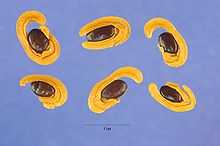Acacia cyclops
| Red-eyed wattle | |
|---|---|
 | |
| Seeds | |
| Scientific classification | |
| Kingdom: | Plantae |
| (unranked): | Angiosperms |
| (unranked): | Eudicots |
| (unranked): | Rosids |
| Order: | Fabales |
| Family: | Fabaceae |
| Genus: | Acacia |
| Species: | A. cyclops |
| Binomial name | |
| Acacia cyclops A.Cunn. ex G.Don | |
Acacia cyclops, commonly known as red-eyed wattle or western coastal wattle, is a coastal shrub or small tree in the family Fabaceae. Native to Australia, it is distributed along the west coast of Western Australia as far north as Jurien Bay, and along the south coast into South Australia.
It is found in locations exposed to coastal winds, red-eyed wattle grows as a dense, dome shaped shrub; this helps protect against salt spray, sand-blast and erosion of soil at the roots. When sheltered from the wind, it tends to grow as a small tree, up to seven metres high. Like many other Acacia species, red-eyed wattle has phyllodes rather than true leaves. The phyllodes range from four to eight centimetres long, and from six to twelve millimetres wide. Its flower heads are bright yellow spherical clusters. Very few flower heads are produced at a time, but flowering occurs over a long period, from early spring to late summer. This is unusual for Acacia species, which normally flower in one brief but impressive display.
Both the common and species names refer to the appearance of the pods when first open in late spring: each shiny black seed is encircled by a thick orange-red stalk, resembling a bloodshot eye.
Red-eyed wattle can be used to help stabilise coastal sands. It was introduced into Africa for this purpose, but it has spread rapidly and is now a serious pest in southern Africa, where it is known as rooikrans (in Afrikaans, "red garland") . The introduction of the gall-forming cecidomyiid Dasineura dielsi as a biological control has had limited success in the effective control of this weed.
The green seed pods may be used as a natural soap, by crushing them and using the pods with water to wash with.
See also
- Invasive plants of Australian origin
Further reading
Badalamenti, Gristina, La Mantia,Novara, Pasta, Lauteri, Fernandes, Correia, Maguas, Emilio, Luciano, Tomass, Agata, Salvatore, Marco, Patricia, Otilia, Cristina (1 November 2014). "Relationship between recruitment and mother plant vitality in the alien species Acacia cyclops A. Cunn. ex G. Don" 331. pp. 237–244. doi:10.1016/j.foreco.2014.08.016.
| Wikispecies has information related to: Acacia cyclops |
- "Acacia cyclops". Flora of Australia Online. Department of the Environment and Heritage, Australian Government.
- "Acacia cyclops". FloraBase. Department of Environment and Conservation, Government of Western Australia.
- Powell, Robert (1990). Leaf and Branch: Trees and Tall Shrubs of Perth. Perth, Western Australia: Department of Conservation and Land Management. ISBN 0-7309-3916-2.
| Wikimedia Commons has media related to Acacia cyclops. |